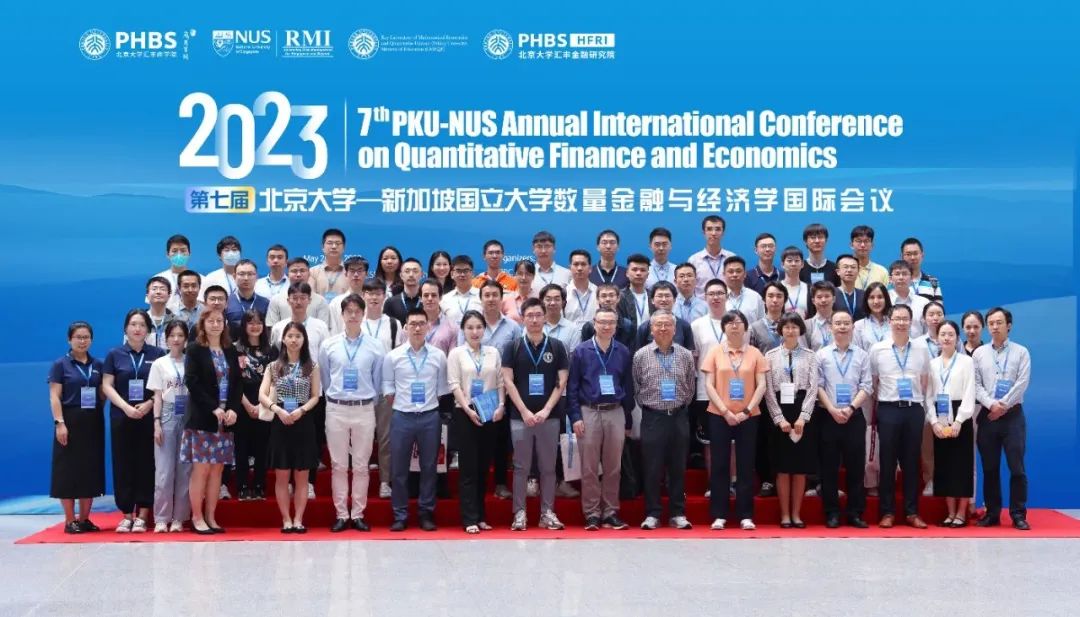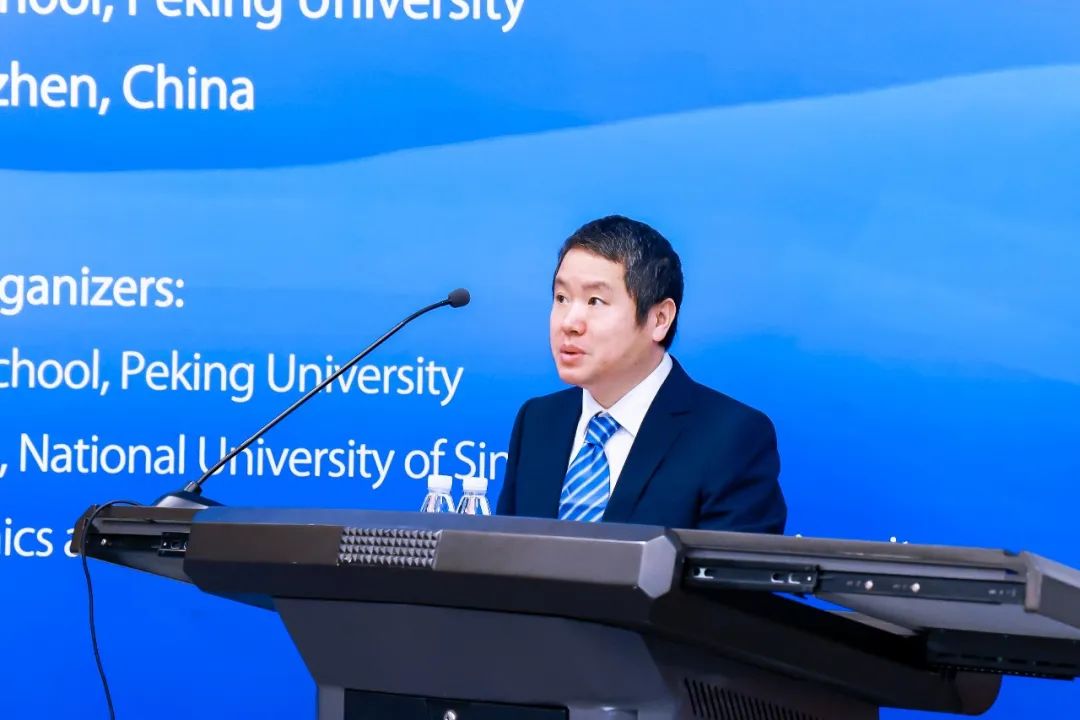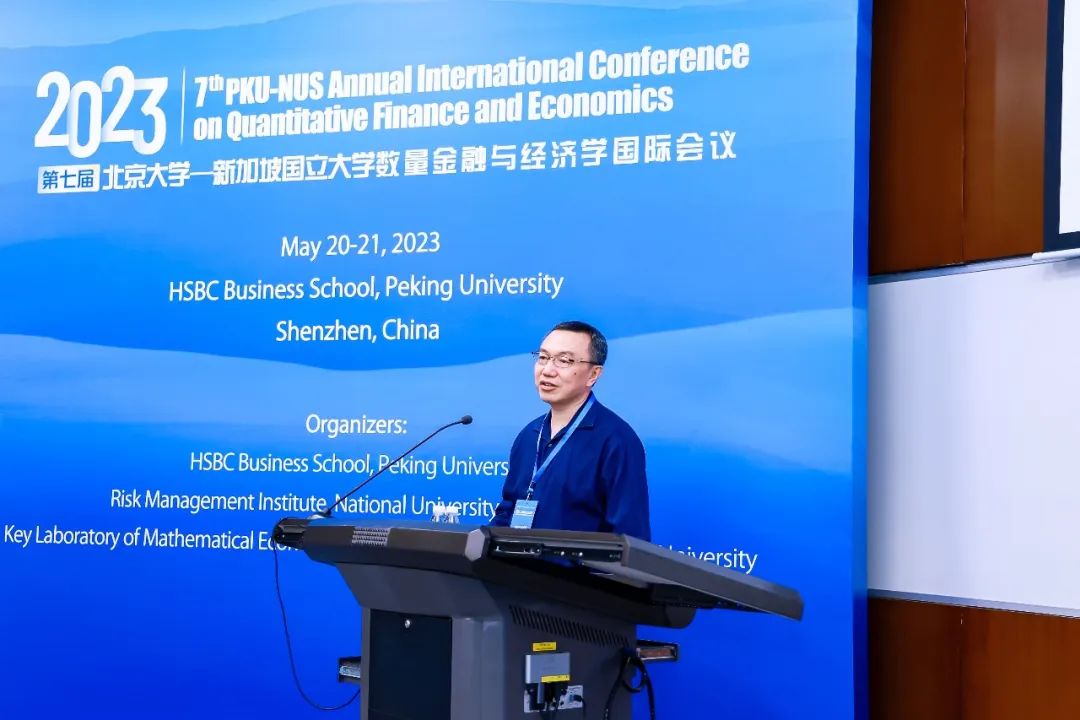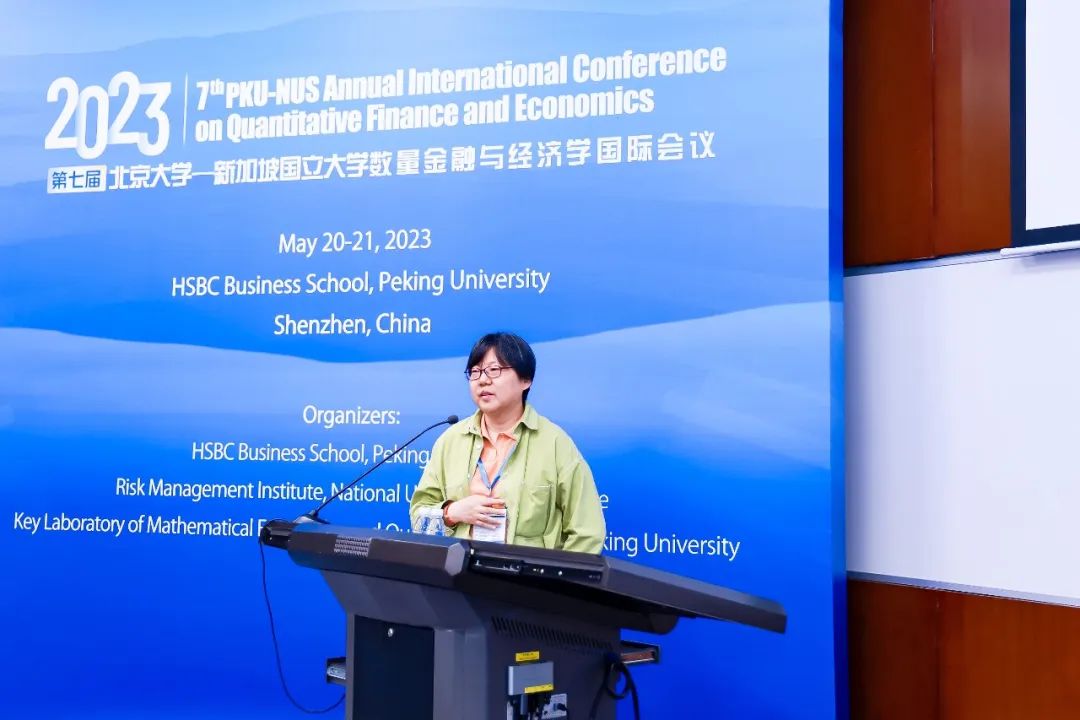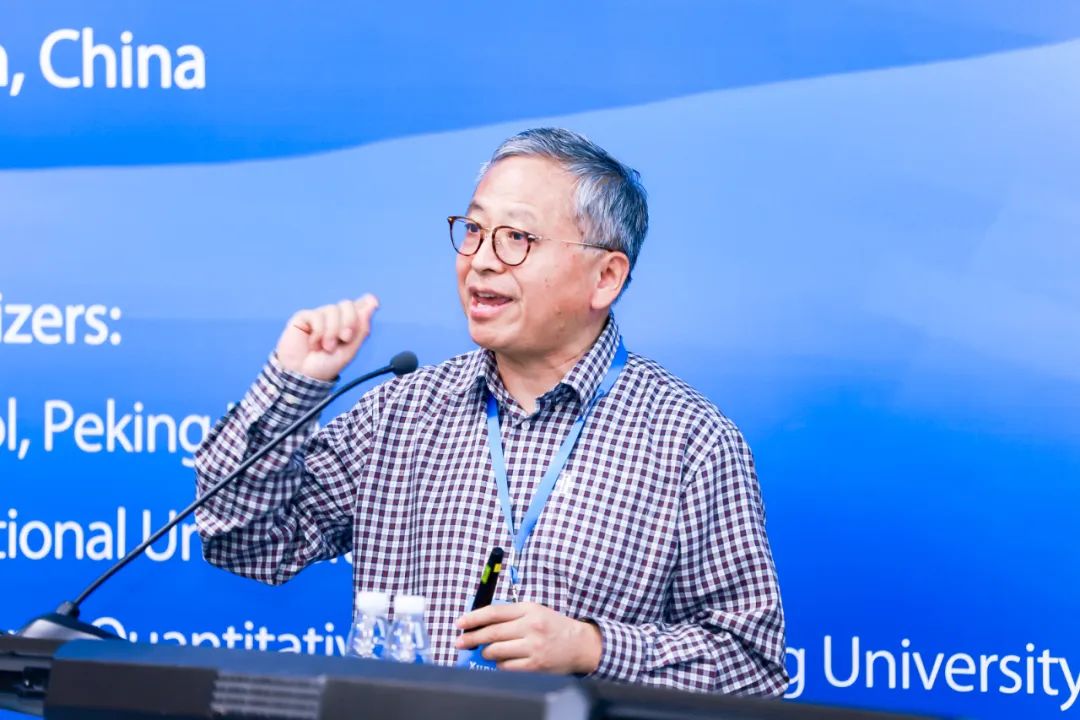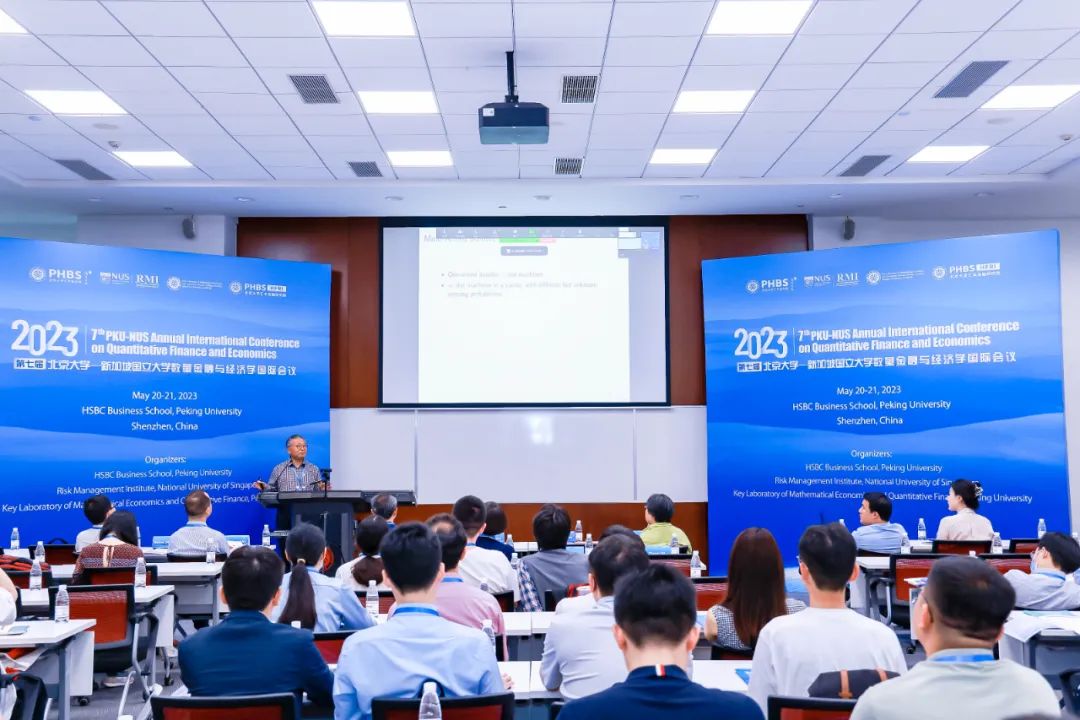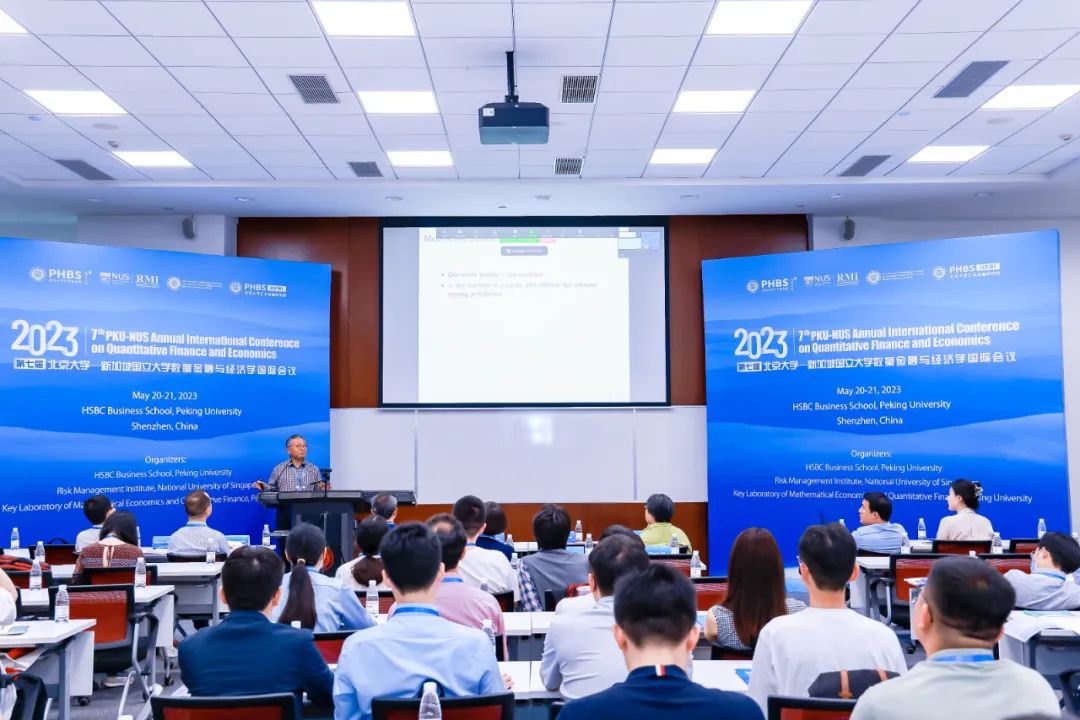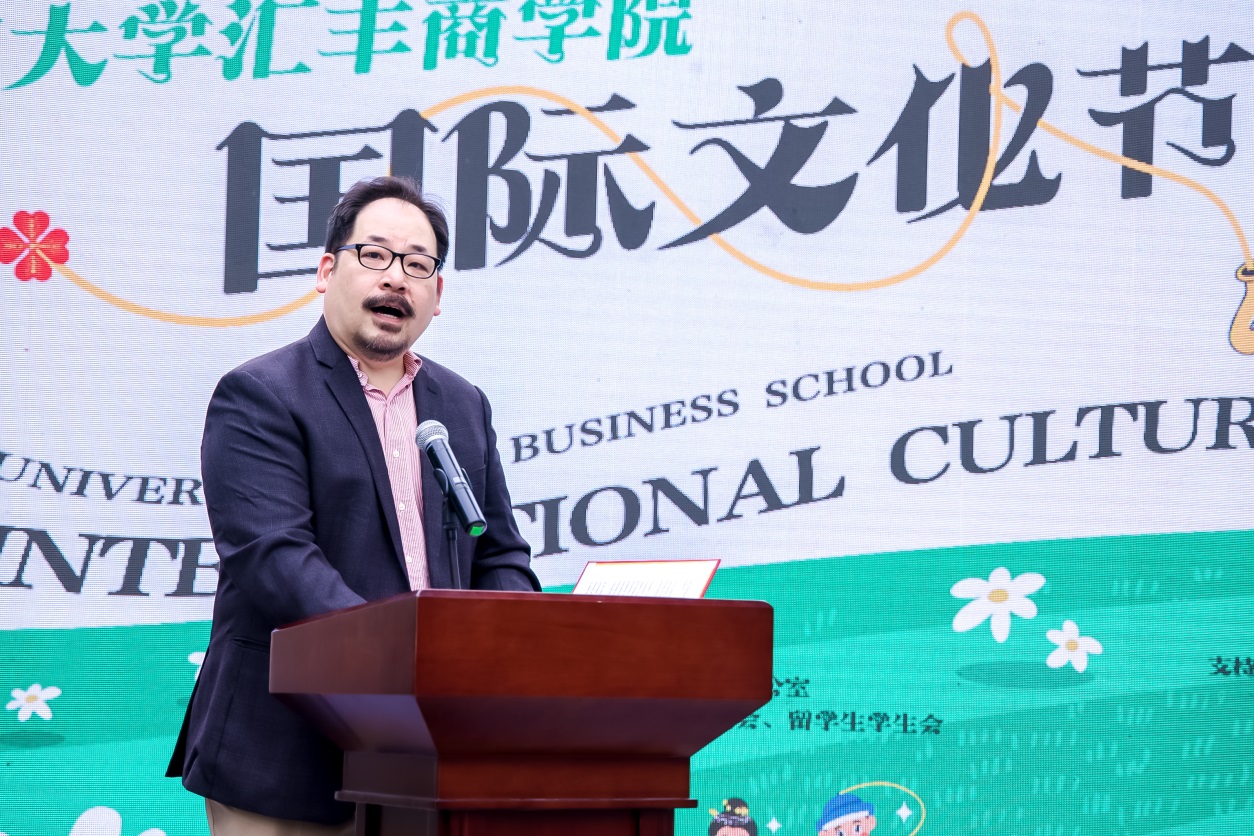The Seventh PKU-NUS Annual International Conference on Quantitative Finance and Economics was held at Peking University HSBC Business School (PHBS) from May 20 to 21. Jointly organized by PHBS, the Risk Management Institute (RMI) of the National University of Singapore (NUS), and the Key Laboratory of Mathematical Economics and Quantitative Finance of the Ministry of Education at Peking University, this year’s annual conference attracted more than 200 scholars to attend online and onsite, discussing new methods and sharing the latest research findings in various fields of quantitative finance and economics.
Group photo of the conference attendees
Opening remarks were delivered by Professor Wang Pengfei, Vice Chancellor of PKU Shenzhen Graduate School and Dean of PHBS; Professor Chen Kan, Deputy Director of RMI at the National University of Singapore; and Professor Wu Lan, Head of the Department of Financial Mathematics at the School of Mathematical Sciences, Peking University.
Professor Wang Pengfei
Professor Chen Kan
Professor Wu Lan
Professor Wang expressed his heartfelt gratitude to our co-organizers and reflected on the longstanding cooperation between PHBS and NUS. He also introduced PHBS’s academic achievements in 2022 and hoped that this conference could help to promote collaboration among scholars and keep close track of academic advancement. Professor Chen briefed on the recent development of RMI, noting that PKU and NUS should further enhance cooperation and relations. Professor Wu introduced the research of the Key Laboratory of Mathematical Economics and Quantitative Finance at Peking University and hoped that this conference could promote in-depth and extensive academic exchanges and cooperation among universities. PHBS Associate Professor Peng Xianhua presided over the opening ceremony.
Zhou Xunyu, Chair Professor of Financial Engineering at Columbia University in New York, and Director of FDT Center for Intelligent Asset Management
Professor Zhou Xunyu gave his keynote speech “Reinforcement Learning in Continuous Time and Its Financial Applications.” He pointed out that reinforcement learning (RL) could solve stochastic control problems efficiently without the knowledge of environment as it balances exploration and exploitation through randomization. However, existing RL methods focus on discrete-time Markovian decision problems and cannot interact with the environment at high frequencies. Many of them even lack a theoretical and unified framework. Therefore, Professor Zhou proposed a continuous-time RL framework by a series of papers. The new framework introduces exploration through stochastic policy and provides solutions of control problems under stochastic policy, develops policy evaluation method without knowing model parameters, and proposes a continuous-time q-learning algorithm for policy improvement. The application of the proposed methods to the mean-variance portfolio selection problem achieves better performance than the market and other discrete-time RL methods for portfolios of stocks in the S&P 500 index and the CSI 300 index. After the keynote lecture, participants discussed topics such as choice of exploration rate in RL.

Darrell Duffie, Adams Distinguished Professor of Management and Professor of Finance at the Graduate School of Business, Stanford University, and Senior Fellow at the Stanford Institute for Economic Policy Research
Professor Darrell Duffie gave a keynote lecture titled “Dealer Intermediation Capacity and US Treasury Market Functionality.” He conducted a quantitative analysis on the U.S. treasury market and found that during the outbreak month of the COVID-19 pandemic, the gross sales of US treasuries by foreigners and the dealer-to-customer bid-offer spreads surged, and the liquidity of treasury market and the inter-dealer market depth plummeted. He pointed out that the U.S. treasury market consists of two parts, namely the inter-dealer market and the market between customers and dealers. The resilience of the US treasury market is limited by the intermediation capacity of dealers. Under normal conditions, the US treasury illiquidity rises in promotion to the increase of yield volatility. However, the extreme illiquidity in March 2020 cannot be explained by the yield volatility but can be explained by the exhaustion of dealer capacity. Professor Duffie suggested that the central bank should monitor the balance sheet capacity of dealers, proposed an improved treasury auction mechanism, and further suggested that the central bank need to distinguish between market function purchases and quantitative easing. After his speech, attendees discussed topics such as the auction mechanism of the U.S. treasury market and China's bond market.

Rama Cont, Statutory Professor of Mathematics and Head of the Oxford Mathematical and Computational Finance Group
In the keynote speech “Excursion Risk: A New Approach to the Analysis of Dynamic Trading Strategies,” Professor Cont proposed a mathematical framework for analyzing the risk of dynamic trading strategies using price excursions. The framework introduces δ-excursions, paths of trading signals that start from the level of 0, deviate to the level of δ, and then return to 0. The unique decomposition of continuous paths into δ-excursions enables path-wise analysis, providing insights into the analysis of number of trades, profit, loss, and drawdown of trading strategies. A trading signal modeled as a Markovian process can be decomposed into concatenation of independent δ-excursions by Ito’s excursion theory. This leads to analytical results for the risk analysis of trading strategies in which signals follow linear diffusion models and allows for construction of new stochastic processes based on excursions. After his speech, participants discussed the relationship between optimal trading signal threshold and sample path smoothness.
The organizers of this conference also selected 50 high-quality academic papers from numerous submissions, and invited the authors to attend the conference and share their research findings. These papers covered various fields including microeconomics, financial modeling, quantitative economics, portfolio selection, macroeconomics and monetary economics, financial markets, macroeconomics with information friction, algorithmic trading and actuarial science, computational finance, financial engineering and Fintech, etc.
Attendees listen to the presentations
Other scholars presenting and discussing papers came from world-renowned universities and institutions, including the University of North Carolina, the University of Illinois, Arizona State University, Cambridge University, Oxford University, National University of Singapore, Peking University, Tsinghua University, Hong Kong University, the Hong Kong University of Science and Technology, the Chinese University of Hong Kong, the City University of Hong Kong, Zhejiang University, Fudan University, and Wuhan University. Eight faculty and students from PHBS, including Peng Xianhua, Jaehyuk Choi, Seungjoon Oh, Wang Yicheng, Yunus Topbas, Song Kaihong, He Hemin, and Zhou Weimin, presented their papers and shared their recent research findings with attendees.
Initiated in 2016, the PKU-NUS Annual International Conference on Quantitative Finance and Economics has been held to provide a platform for researchers and practitioners from academia and industry to discuss and exchange ideas about the new development in quantitative economics and finance.
By Annie Jin, Wu Yi, Wu Yizou
Source: PR and Media Office & Research Office





